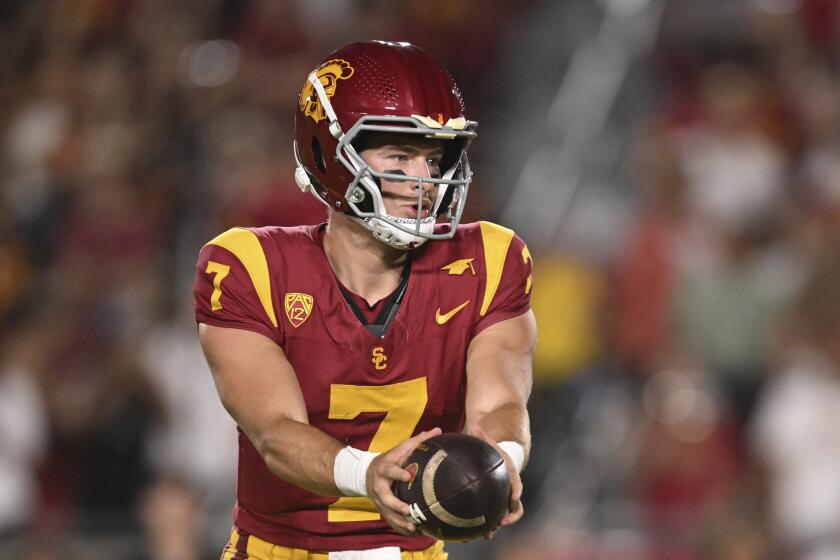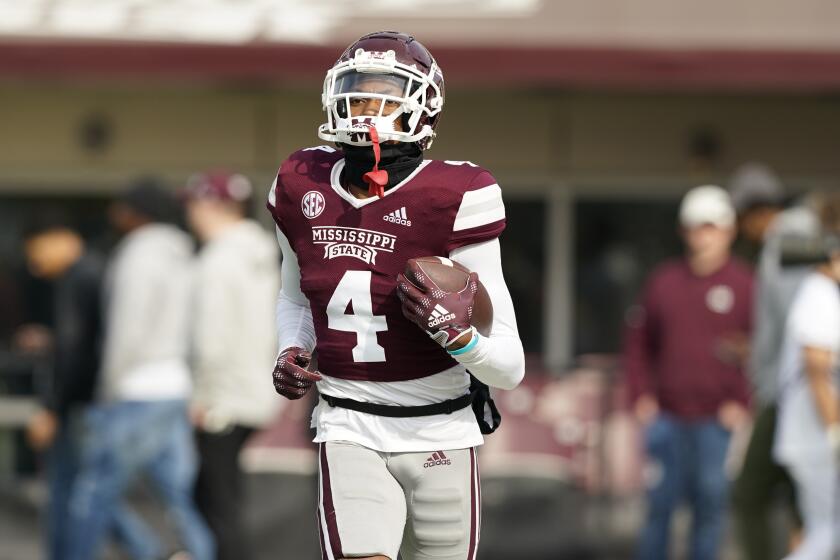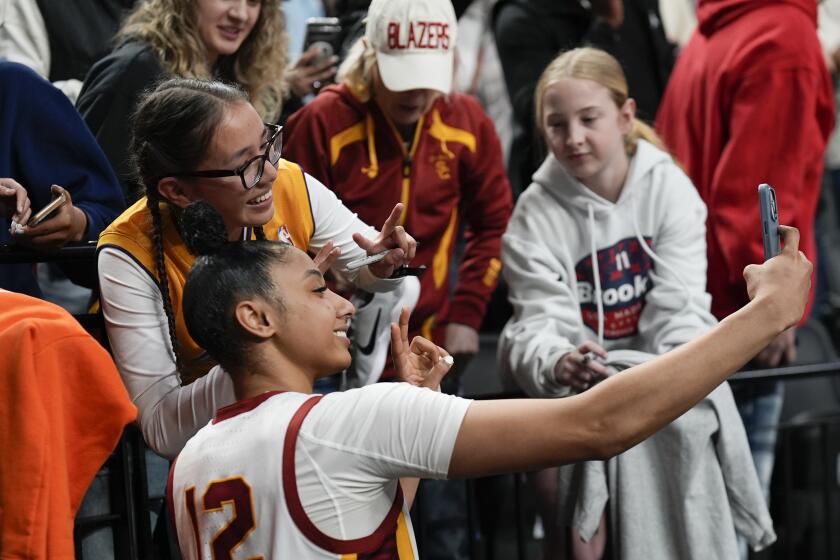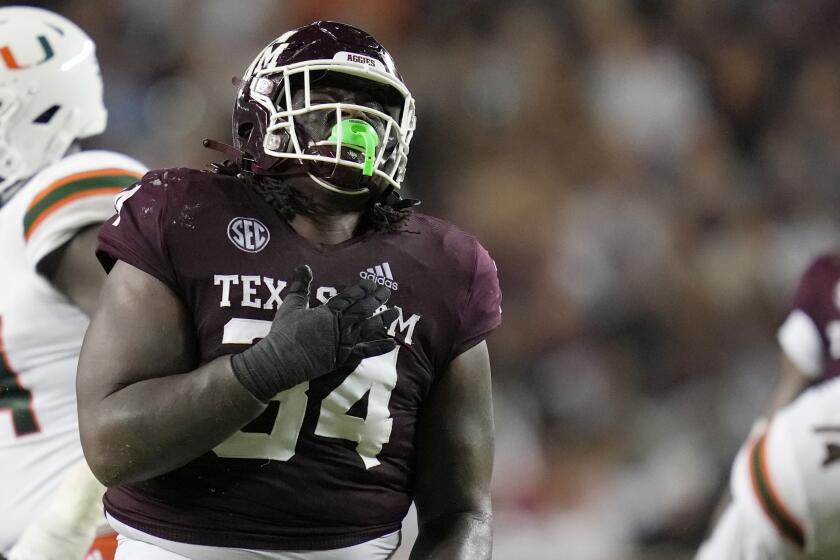Many see a clean slate in Friday’s inauguration of USC president
If the incoming USC president needed a reminder that allegations involving the football team had damaged the university’s broader reputation, he got one during a bicycle ride this summer.
C.L. “Max” Nikias, who had not yet started his new job, was wearing a USC T-shirt as he tooled around Sun Valley, Idaho, in June, soon after the NCAA announced sanctions against the university’s sports programs. He had already had some discussions about how to respond to the NCAA, but shouts of “Shame on USC” from passersby in the resort town were a turning point, he says.
A few weeks later, in actions applauded on and off the campus, Nikias ousted athletic director Mike Garrett, replacing him with former USC quarterback Pat Haden, a longtime trustee. He also ordered officials to return the university’s copy of the 2005 Heisman trophy won by former running back Reggie Bush, whose NCAA violations were a major cause of the sanctions. USC is appealing the severity of the penalties, which include banning the football program from bowl games for two years, but Nikias was able to calm the catcalls and emerge through the crisis to start his presidency in August.
On Friday morning, Nikias, a Cyprus-born electrical engineer who was USC’s second in command for five years, will be formally inaugurated as the school’s 11th president in a campus ceremony expected to draw about 10,000 guests.
In a recent interview, Nikias previewed his inauguration speech and discussed his goals for the Los Angeles university, which enrolls about 34,000 students. He said he wants to accelerate improvements in USC’s academic quality and financial health made during the 19-year presidency of Steven B. Sample, who retired this summer.
“Especially now, at the time when most of our public university competitors have challenges … we have to run the next marathon at a sprinter’s pace,” said Nikias, 58, his Greek-Cypriot accent still strong.
As for sports, Nikias promises more transparency, tougher ethical standards and better relations with the NCAA. “We want other universities to learn from our experience because the dangers out there are real,” he said.
Nikias said other goals include tripling the school’s $3-billion endowment in the next 10 to 15 years, a target much larger than he discussed when he was appointed president in March. He said that USC will launch a major fundraising drive next fall and that he hopes to announce significant new donations at his inauguration.
On the academic front, Nikias said he plans to recruit superstar professors aggressively from around the nation and world to join the USC faculty in all areas of humanities, arts and sciences.
He especially wants to build up the university’s biomedical and biotech programs. If physics and electronics were the most important areas of science in the last century, “the 21st century is the century of medicine and biology,” he said. “As a research university, if you don’t want to marginalize yourself, you have to be sure you are very strong in those areas.”
Another, potentially controversial, goal is to make USC’s undergraduate student body geographically more diverse, he said, by cutting the percentage of Californians to 40% from 50% now. He wants to open USC recruiting and fundraising offices in San Francisco and New York, along with others in South America, while expanding the university’s presence in India, China and South Korea. And he hopes to build more, and improved, housing for graduate students.
As Nikias gets started, experts said his relatively swift response to the NCAA investigation allowed his presidency to appear as a fresh start, even though he was close to Sample. Critics had complained that the former president responded too slowly to the athletic department’s troubles.
“You can improve on any president’s record, even one with a legacy as strong as Sample’s,” said Patrick M. Callan, president of the National Center for Public Policy and Higher Education.
Historian Kevin Starr, who is a USC professor, said he too was pleased with the way Nikias handled the sports crisis. The new president, a former dean of USC’s engineering school who holds patents in signal procession for radar and sonar communications, “is a problem solver,” Starr said. “Engineers don’t like broken things. They like to fix them.”
In 1974, when Nikias was an undergraduate engineering student in Athens, his family was displaced in the Turkish invasion of northern Cyprus, and resettled in the south. Nearly 30 years later, he returned for the first time to his hometown, Famagusta, part of which remains a ghost town.
Now, Nikias said, he has discovered an unusual connection between the land of his birth and the Mudd House, USC’s presidential mansion in San Marino. The residence was donated to USC by a philanthropist whose family grew rich mining copper on Cyprus, and Nikias and his wife Niki learned recently that the house once contained murals of Cypriot landscapes. They hope to locate the artworks, he said.
“Even the playwrights of antiquity would have been intrigued by those coincidences,” he said.
Go beyond the scoreboard
Get the latest on L.A.'s teams in the daily Sports Report newsletter.
You may occasionally receive promotional content from the Los Angeles Times.




